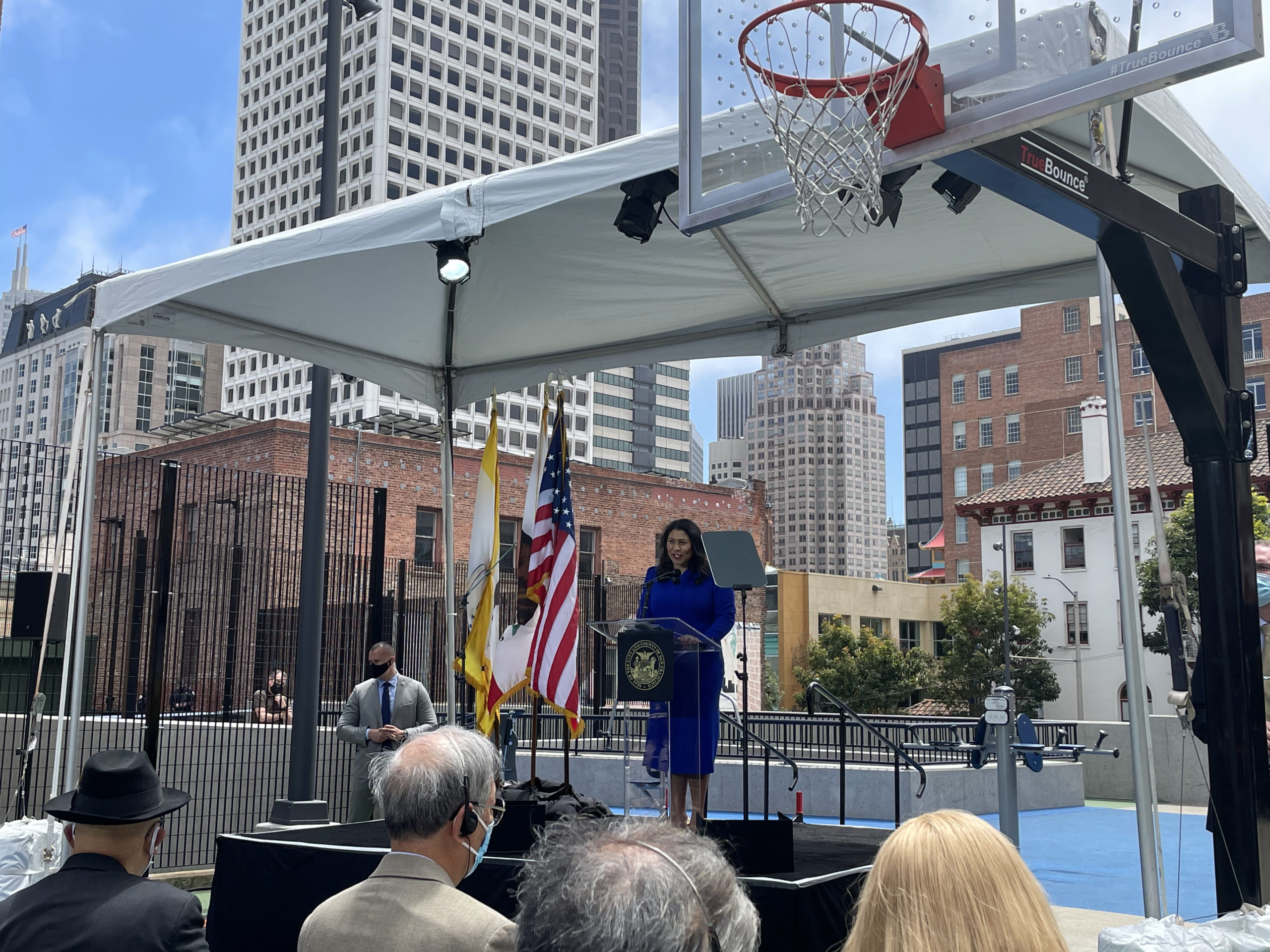Mayor London Breed unveiled a sweeping budget proposal that will help the city recover from the COVID-19 pandemic while tackling deep-rooted issues such as homelessness, she said in a speech on Tuesday.
Speaking at Willie “Woo Woo” Wong Playground in Chinatown, Breed hailed San Francisco’s success in tamping down COVID-19 cases and outlined her budget priorities for the upcoming budget cycle, which include investments in housing and shelter, mental health and overdose response, public safety and newer initiatives such as guaranteed income and childcare.
“I can finally declare with pride and confidence that we are literally out of the woods," said Mayor London Breed.
After more than a year of COVID-19 restrictions, and with local tax revenues significantly weakened as a result, San Francisco is set to receive roughly $650 million in federal aid that makes it possible for the city to balance its budget without laying off public workers. San Francisco operates on a two-year budget cycle, and the Mayor’s office allocated $13.1 billion for the fiscal year ending in June 2022, followed by $12.8 billion the following year.
Expanding Public Safety
Amid a spate of attacks on seniors and Asian-American residents, Breed touted several new programs aimed at expanding public safety—with and without police officers.
Breed noted high turnover in San Francisco’s police department, saying that about 80 of San Francisco’s 2200 police officers leave the force annually. Breed proposed two new academy classes to "keep our ranks stable,” allow consistent beat patrols in neighborhoods such as the Tenderloin and make the department more diverse.
The Mayor’s proposed budget also includes $65 million over two years to fund non-police interventions, including community-based patrols, a “safety ambassador” program planned for downtown and Union Square, and a new Office of Justice Innovation dedicated to crafting non-police responses to safety concerns. Breed also hopes to expand so-called street crisis response teams—who assist individuals in distress in lieu of police officers—from seven planned response teams to 14 total.
Tackling Homelessness
With $1 billion in federal, state and local funding, Breed aims to dramatically reduce homelessness by expanding housing and shelter options alongside behavioral health services.
“We have the chance to make a fundamental change,” said Breed, saying that her proposal will help steer more unhoused people into permanent, stable housing while reducing the number of unsanctioned encampments on the street. According to a public dashboard circulated by the Mayor’s office, the number of tents dropped by about two-thirds between April 2020 and April 2021.
Under a homelessness recovery plan published last year, Breed aims to add at least 6,000 new placements—a combination of shelters, supportive housing and alternative sites—and fund the “largest expansion of permanent supportive housing in over 20 years.”
In the upcoming budget cycle, Breed also hopes to fund 640 new treatment beds for substance use and behavioral health issues, boost case management and support services and expand operations at San Francisco’s Behavioral Health Access Center, which serves as an entry point for the city’s addiction treatment and mental health care systems.
Funding An ‘Equitable Recovery’
Breed’s budget proposal includes $477 million in spending over the next two years for initiatives intended to accelerate the city’s economic recovery and increase opportunities for communities hit particularly hard by the pandemic.
With the goal of driving an “equitable recovery,” Breed plans to continue funding the Dream Keepers initiative, a program created last year in the wake of the George Floyd protests, that seeks to reallocate $120 million from law enforcement funding to San Francisco’s Black and African-American communities.
The Mayor’s budget also includes funding for job training programs, child care for women re-entering the workforce after the pandemic and a planned expansion of the city’s universal basic income pilot, which is currently targeted at local artists affected by the pandemic. Breed also hopes to allocate $144 million to “lay the groundwork” for a universal childcare program in San Francisco, including childcare subsidies, workforce compensation for providers, child health and wellbeing programs, and mental health support for students.
The Budget Process
The Mayor and the Board of Supervisors will spend the next several weeks debating and revising the budget, with Supervisors expected to release their budget priorities on June 8.
Alongside Breed’s speech on Tuesday, the San Francisco Controller’s Office released a full, 315-page breakdown of the proposed two-year budget.
Over the next month, individual city departments will present their own budgets, and budget analysts will issue reports for review by policymakers. The public will have an opportunity to weigh in at a hearing scheduled for June 25.
Final budget deliberations will begin at the end of June, and Breed will sign the budget by August 1.
